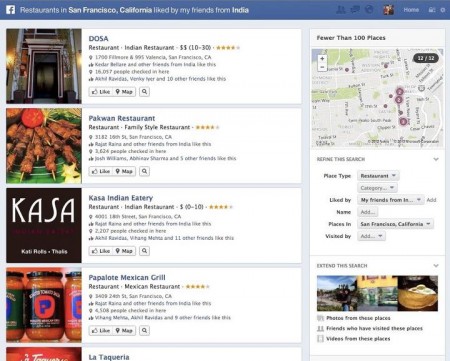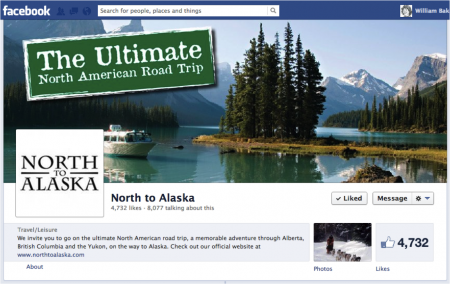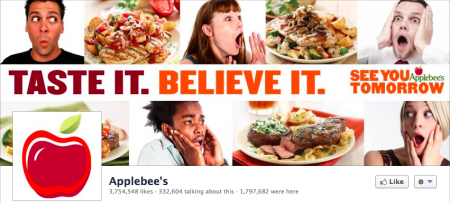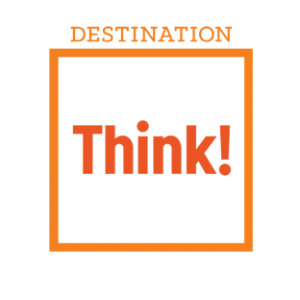The Archives
-
Internet, Marketing, social media, Travel & Tourism
Graph Search is something people might just love
In 2010 I wrote that Tripadvisor’s integration of Facebook connect offered a glimpse into the future. Well the future is here.
Graph Search, announced yesterday by Facebook, is a new way of searching. It’s using taking your social graph and the content shared on Facebook as the basis of relevancy. Graph Search will allow you to search for things based on your personal network of friends, your ‘friends-of-friends’ or Facebook users in general.
You can soon search on Facebook for “restaurants in San Francisco liked by people who live in San Francisco”.
Or “restaurants in San Francisco my friends like”.
Or “restaurants in San Francisco liked by my friends who live in San Francisco.”
Or “Restaurants in San Francisco liked by my friends from India”
The possibilities are endless.
The travel decision process is going to be massively influenced when Facebook users adopt this kind of functionality. Because travel product is a heavy used item on Facebook. People check in, share photos and like places they’ve been all the time.
A whole new world of discovery and travel inspiration might open up. Imagine searching for “Places people check-in who like scuba diving”
Or “Cities people check-in who like art”
Or “festivals people like who like Greenday”
Or “pictures from my friends in Berlin”
Yesterday I also read a nice post by a Techcrunch writer about a recent frustrating trip to the new MySpace. This part caught my attention and made me think.
Wait, how does Myspace know I would like these?Is everyone seeing the same ones? Did Justin pick them out for me? Are my friends listening to these guys? I have no context here. I don’t understand why they’re recommended. I decide to move on.and
I mean really, I logged in with Facebook – would it have killed you to look through my “likes” for a bit of personalization here?A Techcrunch writer is obviously ahead of the curve. But what’s happening here is that people are starting to expect websites to personalize based on their previous behaviour and what they or their friends like on Facebook.
I remember being freaked out when Amazon recommended me books based on my previous purchases. Or when a laptop bag followed me around the internet thanks to remarketing. But that’s a long time ago. I don’t get freaked out anymore. We’ve gotten used to it. We even like it. We get mad when we see ads that aren’t relevant. And Facebook’s Graph Search might just deliver exactly the functionality at the right time. And travel and tourism marketing will never be the same. You better get ready.
-
Marketing, social media
Two Facebook pages best practices
North To Alaska
First there’s the ‘North to Alaska’ page. I know this page well because it’s managed by Think!’s Dustin. And he’s killing it!
It’s the only page I know on Facebook where the ‘people talking’ almost always outnumbers the number of ‘likes’ with hardly running any ads. Besides sharing mind blowing photos, Dusty is also doing everything right to engage the community. Drawing engagement from fans, involving them in answering questions and recognizing fans for great contributions. The page has build a community of very passionate people who love the Alaska highway. The almost 5,000 fans reach tens-of-thousands because of the great community management.
<sales>
Dusty also conducts our populair social media audits. He will review your page, tell you what you do well, where you can improve and how. Just drop us a note for info.
</sales>
Applebee’s
Applebee’s? The restaurant chain? Yes, that Applebee’s.
Now the postings on the page itself is not bad, but it’s not great either.
It’s the way they handle what people post on their page. A few months ago some teenagers started ‘trolling’ the page. An ‘Applebee’s Reply Guy’ was created and has turned trolls into fans. Click on ‘See All’ where it says ‘Recent Posts by Others on Applebee’s’ and learn from how they respond to good comments, bad comments and how they use wit and humour when appropriate.
I was made aware of this page at #Somet12. Think!’s Mikala wrote a great post about it.
Update Feb 4, 2013. Apparently the Applebee’s Reply Guy lost his way (or did they change agency).
-
Internet, Marketing
So What? Gmail Priority Inbox & Facebook’s Social Inbox
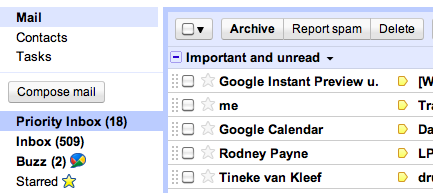
Google added a new feature to Gmail recently called priority inbox and Facebook today announced something similar with their social inbox. Google and Facebook are using algorithms to predict the messages you really care about from the ones you don’t and put them in different folders for you. You can further refine this yourself of course.
So what?
I’ve been using this feature in Gmail a lot. I love it. Because it separates the few emails I really need to respond to from the ones I don’t. The emails that don’t make the priority list include all enewsletters I’ve signed up for. I scan the non-priority emails once or twice a day to make sure there’s nothing important in there.
The implications for direct markers are that this feature is another barrier between your email message and a consumer’s attention. It’s not just about getting permission anymore, you better make the priority list as well.
Keep an eye on your open rates for gmail (and soon Facebook) users. Are they dropping below average? This means these features might be impacting your marketing and you should re-think your strategy. The key is to be relevant in the content you serve and in the frequency of communication, or people will ignore you.
-
Internet, social media, Travel & Tourism
First look at Facebook Questions – Lots of potential
07.28.10 | Permalink | 8 Comments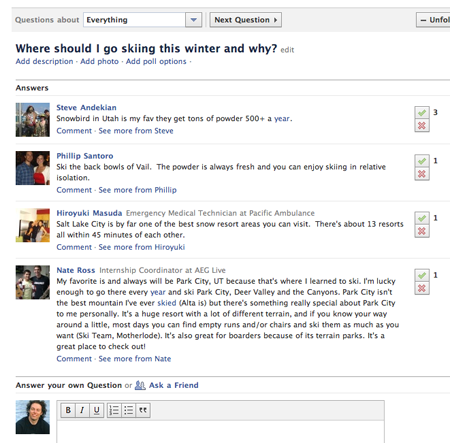
Today Facebook launched Facebook Questions, “a beta product that lets you pose questions like these to the Facebook community. With this new feature, you can get a broader set of answers and learn valuable information from people knowledgeable on a range of topics.”
The new feature is slowly being rolled out. It’s extremely buggy for me at the moment. Searching for questions about specific topics or keywords doesn’t work at all for example.
But the concept is becoming clear.
Facebook is making clever use of the social graph (friend networks) and user profiles. Questions asked by my friends and topics I’ve have listed as interests where listed first for me. You can also send a question to a friend. Inside Facebook as more details about the product and how the social graph is used.

What’s great for fanpage owners is that you ask and answer questions as the fanpage.
For DMO’s and travel operators, monitoring questions and answering them can be a powerful way to built relationships with potential customers. Besides it’s incredible userbase, its use of the social graph and ability for fanpages to participate makes it a great tool for engagement.
-
Internet, Marketing, social media, Travel & Tourism
Tripadvisor offers a glimpse into the future
07.12.10 | Permalink | 4 Comments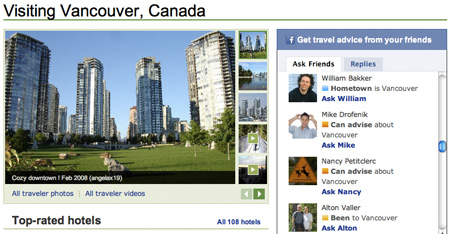
Science fiction writer William Gibson once said “The future is already here – it’s just not evenly distributed.” You can see what some of the future will look like with Tripadvisor’s ‘Trip Friends’.
About 7 years ago we ran some focus groups in San Francisco to learn more about the trip planning process. I remember that involving real people was a very important part of the process. I concluded that people prefer to talk to people in this order:
- People they know and live in the destination they want to visit
- People they know and have been in the destination they want to visit
- People they don’t know and live in the destination they want to visit
- People they don’t know and have been in the destination they want to visit
Tripadvisor is serving up information from group #4 very well; with it’s reviews and message boards. With their ‘destination experts’ on their message boards they also started using group #3.
Now Tripadvisor has also figured out a way to include groups #1 and #2, the most credible sources of information to a trip planner.
A few years ago, Tripadvisor bought the Facebook app “Where I’ve been” for a reported $3M. At the time it was a gimmicky app where you could plot pins on a map for places you’ve visited anywhere in the world. The app was successful because it taps into one key motivator for travel; making my friends and family jealous of the places I’ve been. Tripadvisor also bought it’s 2.3M users. Tripadvisor rebranded it “Cities I’ve visited” and incorporated it into it’s website and has done a decent job of improving it.
Users can add cities they’ve visited, where they want to go, their favourite cities and what cities they can give advise for. The app has an active userbase of 4.8M when I checked today. And I’m sure there are many more users on the Tripadvisor website. As a result, Tripadvisor has an incredible amount of intelligence about their member’s travel history and desires.
Tripadvisor has mashed up with own intelligence with Facebook’s through Facebook Connect and the Open Graph. When you log into Tripadvisor with Facebook connect, and you visit a city page, you’ll now see a list of your friends who:
- live in a particular city
- have a particular city listed as a favourite
- have been to a particular city
- are going to a particular city
Tripadvisor allows you to use Facebooks social networking tools to send a message to one or more of your friends to ask for advise about your upcoming trip based on this information.
Even though it’s a small step, it’s very useful and also a significant indicator of future possibilities for combining your own consumer data (like Tripadvisors data about where people have been) with Facebook’s social graph and social networking power.
“The future is already here – it’s just not evenly distributed.”
Note: I intended to write this post much sooner. But the future is also unevenly distributed by individual and my attempts to login to Tripadvisor with Facebook connect has resulted in error messages for a month now. I’ve reported the error at least a dozen times but I had to resort to using my wife’s Facebook credentials to have a look at this feature.
-
Internet, social media
Facebook down for a week!
03.18.10 | Permalink | 4 CommentsGot your attention didn’t it?
This is purely a hypothetical scenario. It’s also an experiment in dual-blogging (think bloggers meet dual-pianists in Vegas). Rodney Payne from Think! and I are going to be hypothesising about the effects of Facebook shutting down for a week. Instead of commenting on each other’s blogs, we’re going to be posting each other’s responses as a blog.
[WB] Day 1. The Facebook URL stops responding. First thing that happens is an insane amount of activity on Twitter reporting the news. After that all hell breaks loose in the tech blogosphere; Mashable, Inside Facebook, All Facebook, Techcrunch, Techmeme et all just go crazy over the news. Traditional media follows a few hours behind.
[RP] Day 2. Facebook led last night’s evening news and is splashed across the front page of newspapers worldwide. Twitter traffic has more-than-doubled overnight with almost every tweet referencing #Facebook. Tweets have largely replaced status updates. New account registrations have grown significantly. The ‘Twitter Whale’ is displayed frequently to show that Twitter is slow and overwhelmed with traffic. Cell-phone carriers and email providers see a noticeable increase in messages. Blogs are filled with stories guessing at what’s going on.
[WB] Day 3. Everybody who threw a party and used Facebook Events to organize the party is ticketed off because nobody showed up. The first “Life without Facebook” t-shirts are starting to appear. ‘Experts’ on the news networks make suggestions about how to deal with Facebook detox. Facebook is scheduling a new conference for the next day.
[RP] Day 4. People realize that life A.F. (after Facebook) isn’t too scary. Facebook isn’t a matter of life-and-death like internet banking or email. It’s just a convenient social tool. Productivity at offices has surprisingly decreased slightly because many people can’t focus on one task without some distraction. Employees who had learned to collaborate using Facebook messages and Facebook chat are now forced to return to slower methods of communication.
[WB] Day 5. Facebook promises the network will be back up soon. Some businesses complain drops in sales because of a reliance on Fanpages and Facebook ads. Legal action is discussed. Flickr reports an increase in new accounts and uploaded photos. Some kids fear their Farmville animals will die.
[RP] Day 6. You would have thought that with 450 million people addicted to social networking and gaming that a rival-site would rise to meteoric success. However, MySpace hasn’t seen too much of a bump in traffic, commentators think its because of the lack of privacy built into people’s social graph. People who log in to their old accounts find a social wasteland with no posts from legitimate friends and just a scattering of links leading to creepy websites. People are beginning to think that Facebook may never come back online. Google Buzz and Orkut are getting an increased trickle of new users but its just not the same, all of our photos and friends were on Facebook.
[WB] Day 7. Media has nothing left to talk about and tech bloggers are too busy with the latest Apple iSomething. People stop caring about it. Life goes on without Facebook although they wonder what their friends are up to. Facebook announces service will be restored tomorrow and blames a proprietary Microsoft product for causing the crash of it’s service.
[RP] Day 8. The reckoning is upon us. Zuckerberg flicks the switch and issues a press release to that affect which is picked up by every single news organization in the world. Facebook blows past its previous 30% of web traffic to attract over 50% of internet users. Facebook’s servers overload and go down for another hour or two. When they come back online, people connect again, pay-per-click ads resume, and Farmville animals are revived just in time… Life goes on.
-
Internet, Marketing, tourism bc
Tourism BC 2010 Online Olympics activities: #11 – Social Media
An event like the Olympics makes all media, including social media, light up like a Christmas Tree. Everybody’s talking about it, and that’s exactly what we want. Instead of adding to the noise, our strategy for social media during the games focussed on supporting and encouraging key influencers while leveraging our own network.
Listening
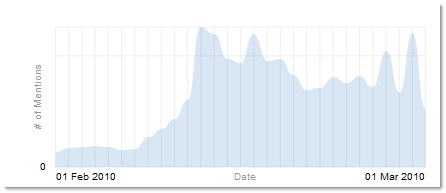
Tourism in BC related social media volume during February
Social media is the largest focus group out there so we treat it as a huge research opportunity. Data has been collected and will be analyzed. We’ve also used our monitoring tools to provide insights to our media, SEM Field Reporters and content teams. This enabled us to quickly respond to unexpected stories.
After the games, we can look at the data to identify what resonated about Vancouver and BC as a destination, potential new markets or product opportunities and key influencers in social media for future engagement.
Assisting and encouraging key influencers
Working with key influencers is a lot like working with travel media professionals (with a twist) especially since many traditional travel media have their own blogs. But there are also pure social media influencers, including local bloggers, athlete tweeters, etc. Jose from our online team has been working closely with our Travel Media team to coordinate efforts.
Building our community

We used the pre-Olympics to experiment with running contests on Twitter. We managed to more than triple our number of followers by giving away some Olympic tickets. We were wondering if people would leave right after, but they didn’t and instead are engaging with Karen, our tweeter extraordinaire, and re-tweeting our messages to their networks.
As an added bonus, our contest winners have been tweeting and blogging about their experiences and traveled around with our Field Reporters.
Engaging our community

Facebook fans and Twitter followers are a diverse group of BC residents, past visitors, tourism industry stakeholders and people who would like to visit. During the games, we tweeted information about the games, general trip ideas based on what was being talked about and re-tweeted messages from others. URLS’s were being tracked and during the games period, drove almost 50,000 visitors to our website.
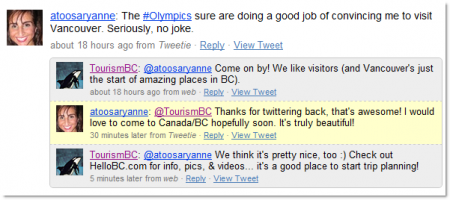
Karen set up searches in Tweetdeck to filter people who expressed an interest in visiting and started the conversation to make the trip a reality leading to wonderful conversations, new followers and hopefully visitors soon.
Lifepoints campaign
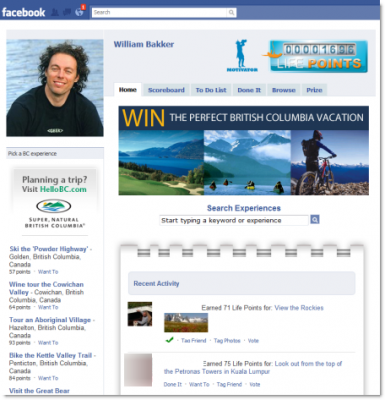
Lifepoints is a Facebook application where you get points for your life experiences. Points are based on how people have rated each experience. Compete with your friends for who gets the most out of life and create your own bucketlist by ‘wanting’ things. A natural fit with tourism so we’re running a campaign with Lifepoints to highlight some of the great experiences British Columbia has to offer and promote our contest.
Field Reporters
And of course we wanted to capture the excitement of the games through our Field Reporters. They’ve been all over town, and the rest of the province, to capture the Olympic vibe, the reactions from spectators, athletes and celebrities, against the backdrop of the destination.
